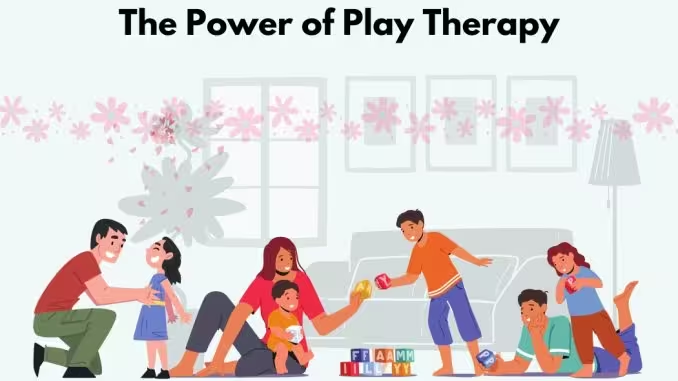As a parent, you want to see your child thrive, both emotionally and socially. But sometimes, challenges arise that children are not equipped to handle on their own. Whether it’s stress, anxiety, or a significant life event, certain struggles may be too complex for children to articulate in words. In these cases, play therapy can be an effective and supportive way to help children express and process their feelings.
Play therapy uses toys, games, and other playful activities to give children a safe space to explore their emotions, cope with difficulties, and develop healthy coping mechanisms. This type of therapy is often beneficial for children who may not yet have the verbal skills or emotional awareness to communicate their struggles. Here, we’ll discuss some of the signs that may indicate your child could benefit from play therapy.
Play therapy is a form of therapy designed to help children express their thoughts, emotions, and experiences through play. Since play is a natural way for children to communicate, this type of therapy allows them to process their feelings in a way that feels comfortable and familiar. A trained therapist guides the play session, providing a safe and supportive environment where the child can engage in activities that reflect their inner world.
Unlike traditional talk therapy, which may be challenging for younger children, play therapy meets children where they are developmentally. Through play, children have the opportunity to explore and work through difficult emotions, behaviors, or experiences with the support of a professional.
Signs Your Child May Need Play Therapy
Children express emotional distress in various ways, and the signs can sometimes be subtle. Here are some indications that your child may benefit from play therapy:
- Persistent Sadness or Withdrawal
If your child seems unusually sad, withdrawn, or uninterested in activities they used to enjoy, it may be a sign of emotional distress. This could manifest as a lack of enthusiasm for playtime, difficulty finding joy in their favorite hobbies, or isolating themselves from friends or family. When sadness or withdrawal persists, it may indicate underlying emotional issues that could be effectively addressed through play therapy. - Changes in Behavior
Significant changes in behavior can often signal that a child is struggling emotionally. These changes might include increased irritability, aggression, or defiance. If your child’s behavior has changed suddenly or seems out of character, they may be expressing emotions that they are unable to verbalize. Play therapy can help them work through these feelings in a safe and supportive environment, allowing them to process and manage their emotions constructively. - Difficulty Managing Anger or Frustration
Children can sometimes struggle with regulating their emotions, especially when it comes to feelings of anger or frustration. However, if your child frequently experiences intense outbursts, tantrums, or has difficulty calming down, they may benefit from the coping skills that play therapy can provide. Through play, children can learn how to manage their anger in healthier ways, gaining tools that will help them regulate their emotions as they grow. - Anxiety or Worry
Anxiety in children can appear in many forms, from excessive worrying to physical symptoms like headaches or stomachaches. If your child appears constantly anxious, expresses fears about things that seem unreasonable for their age, or avoids activities due to worry, they may be dealing with anxiety. Play therapy can help children process these feelings of anxiety in a comfortable and reassuring environment, giving them a way to explore their fears and develop a sense of security. - Experiencing Major Life Changes
Major life events such as a move, a divorce, the loss of a loved one, or the arrival of a new sibling can be confusing and stressful for children. Even if a child doesn’t outwardly express distress, these events can impact their emotional well-being. Play therapy provides a safe space for children to process these changes, allowing them to work through their feelings and adjust to new circumstances. - Difficulty in School or Social Settings
If your child is having trouble at school or struggles to connect with peers, it may be a sign of underlying emotional issues. This could look like difficulty paying attention in class, refusing to participate, or avoiding interactions with classmates. Through play therapy, children can build social skills, increase self-confidence, and develop strategies for handling social challenges in a way that feels natural and engaging. - Regression in Developmental Milestones
Regression, or a return to earlier behaviors, can sometimes occur when a child is facing stress or emotional challenges. For example, a child who has been potty trained may begin having accidents again, or a child who previously slept well might start having nightmares. These regressions can be a sign that the child is struggling to cope with something emotionally. Play therapy can help them express these feelings and regain a sense of stability and security. - Physical Symptoms without Medical Explanation
Physical symptoms like stomachaches, headaches, or other aches and pains that lack a clear medical cause can sometimes be related to emotional distress. For some children, emotional pain can manifest physically, especially if they don’t know how to express their feelings. Play therapy provides a safe outlet for these emotions, allowing children to explore and address the sources of their stress or discomfort in a constructive way.
How Play Therapy Helps
Play therapy offers numerous benefits that support children’s emotional health and development. Here are some ways that play therapy can be effective for children facing emotional challenges:
- Emotional Expression: Play therapy allows children to express their feelings in ways that feel natural and comfortable. This is especially helpful for children who may lack the verbal skills to describe their emotions.
- Building Coping Skills: Through guided play, children learn healthy ways to cope with stress, anxiety, anger, and other challenging emotions. These skills empower them to manage their feelings more effectively, both now and in the future.
- Increasing Self-Awareness: In play therapy, children learn to identify and label their emotions. This helps them develop a greater understanding of their feelings and reactions, which is a crucial step in emotional growth.
- Fostering Resilience: By working through challenges in a safe and supportive environment, children build resilience. Play therapy helps them learn to navigate difficult emotions and situations, preparing them to handle future challenges more confidently.
When to Seek Help
It can be difficult to know when a child needs professional support, especially if they are not openly expressing their struggles. If you notice any of the signs mentioned above, or if you feel concerned about your child’s emotional well-being, it may be worth considering play therapy as an option. Play therapy offers a compassionate approach to helping children process their emotions and develop healthy coping strategies.
At Monarch Counseling, our therapists are trained to provide supportive and effective play therapy for children facing a range of emotional challenges. We believe in creating a safe space where children can express themselves and find comfort in the process of healing.
Children’s emotional well-being is essential for their overall development and happiness. When a child is dealing with sadness, anxiety, behavioral changes, or other emotional difficulties, play therapy offers a gentle and effective way to help them cope. By providing a safe space for children to express their feelings through play, therapy allows children to process their emotions, build resilience, and develop healthy coping skills.
If you believe your child could benefit from play therapy, reach out to Monarch Counseling to learn more about how we can support your family’s needs. Our dedicated therapists are here to guide your child through the healing process, offering them the support they need to thrive.

